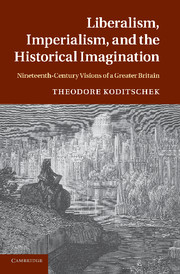 Liberalism, Imperialism, and the Historical Imagination
Liberalism, Imperialism, and the Historical Imagination Book contents
- Frontmatter
- Contents
- Acknowledgements
- List of abbreviations
- Introduction
- 1 Imagining Great Britain: Union, Empire, and the burden of history, 1800–1830
- 2 Imagining a British India: history and the reconstruction of Empire
- 3 Imagining a Greater Britain: the Macaulays and the liberal romance of Empire
- 4 Re-imagining a Greater Britain: J. A. Froude: counter-romance and controversy
- 5 Greater Britain and the “lesser breeds”: liberalism, race, and evolutionary history
- 6 Indian liberals and Greater Britain: the search for union through history
- Epilogue: From liberal imperialism to Conservative Unionism: losing the thread of progress in history
- Index
- References
2 - Imagining a British India: history and the reconstruction of Empire
Published online by Cambridge University Press: 04 April 2011
- Frontmatter
- Contents
- Acknowledgements
- List of abbreviations
- Introduction
- 1 Imagining Great Britain: Union, Empire, and the burden of history, 1800–1830
- 2 Imagining a British India: history and the reconstruction of Empire
- 3 Imagining a Greater Britain: the Macaulays and the liberal romance of Empire
- 4 Re-imagining a Greater Britain: J. A. Froude: counter-romance and controversy
- 5 Greater Britain and the “lesser breeds”: liberalism, race, and evolutionary history
- 6 Indian liberals and Greater Britain: the search for union through history
- Epilogue: From liberal imperialism to Conservative Unionism: losing the thread of progress in history
- Index
- References
Summary
The writings and records of the antient inhabitants of Hindoostan, it is probable, encircle most of the branches of human knowledge. The current learning, however, of its present inhabitants is contracted within very narrow bounds, from the operation of many causes … It is, therefore, only from a diligent research into books that we can expect to become acquainted with the science and learning of the nations of the East.
W. B. Bayley, student essay presented at Fort William College, Calcutta, February 6, 1801, in Primitae Orientales, 2 vols. (Calcutta, 1802–3), I: 40–1This writer, it will be said, has never been in India; and … [has little] acquaintance, with any of the languages of the East. I confess the facts; and will now proceed to mention the considerations, which led me, notwithstanding, to conclude that I might still produce a work of considerable utility, on the subject of India. In the first place, it appeared to me, that a sufficient stock of information was now collected in the languages of Europe, to enable the inquirer to ascertain every important point, in the history of India.
James Mill, The History of British India, 6 vols. [1818] (New York, 1968), I: xx–xxiIn the still more important qualities, which constitute what we call the moral character, the Hindu, as we have already seen, ranks very low; and the Mahomedean is little, if at all above him. […]
- Type
- Chapter
- Information
- Liberalism, Imperialism, and the Historical ImaginationNineteenth-Century Visions of a Greater Britain, pp. 56 - 98Publisher: Cambridge University PressPrint publication year: 2011


